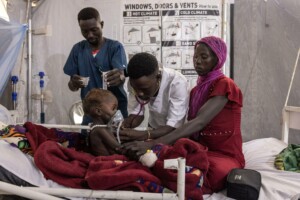Sudan OCHA bulletin 3: Organisations to take over Tearfund projects in Darfur
Following the closure of Tearfund offices and programmes throughout the country, aid organisations have been concerned about the impact of this on people receiving assistance, reports the United Nations’ Office for the Coordination of Humanitarian Affairs (OCHA) in its latest news bulletin.
Following the closure of Tearfund offices and programmes throughout the country, aid organisations have been concerned about the impact of this on people receiving assistance, reports the United Nations' Office for the Coordination of Humanitarian Affairs (OCHA) in its latest news bulletin.
On 13 January, the international NGO Tearfund issued a statement indicating that the organisation had received notification from the government that Tearfund is to exit the country. This government decision came a month after Tearfund offices across Sudan were visited by government officials who requested the NGO to close operations until further notice. The NGO said that their greatest concern is for the vulnerable people whom Tearfund had been assisting in Sudan, particularly the malnourished children who had been relying on nutrition services. Tearfund has provided 300,000 people each year with life-saving humanitarian support, including feeding centres, clean drinking water, improved sanitation and food production, as well as providing safe environments for children and assisting with local education.
Tearfund was operating 31 nutrition centres in Darfur. The State Ministry of Health (SMoH) is encouraging interested organisations to become partners and benefit from existing staff in facilities to ensure sustainability. In Central Darfur, the UN Children’s Agency (UNICEF) has agreed with the Health Ministry to temporarily take over nutrition centres previously run by Tearfund in the state. Tearfund had been operating 17 nutrition centres in Um Dukhun, Central Jebel Marra, and West Jebel Marra localities, and assisting 8,100 children. In East Darfur, the Ministry has received permission from security organs to take over nutrition supplies at Tearfund storage facilities. These nutrition supplies include five metric tons (MT) of super cereal—used in TSFP—and 953 cartons of Plumpy’nut.
5,000 IDPs arrive in El Geneina town, fleeing violence in West Darfur
The Government of Sudan’s Humanitarian Aid Commission (HAC) and the Sudanese Red Crescent Society (SRCS) estimate that nearly 5,000 people displaced from Mulli and surrounding villages have arrived in El Geneina town, capital of West Darfur State, since 10 January. These people fled their homes following tensions and violence with pastoralists after a member of the pastoralist tribe was found dead near Mulli village. HAC—in collaboration with sheikhs (community leaders)—is currently registering the displaced people who have taken refuge in Abuzar internally displaced persons camp in Geneina town. So far, 130 families (about 650 people) have been registered in the camp. Aid organisations have requested permission to assess the needs of these IDPs, however according to HAC no assistance from aid organisations is required at this stage. On 16 January, government authorities—together with local organisations and traders—sent food (millet, sugar, oil, biscuits, salt) and non-food items (clothing and mosquito nets) to assist the people who remained in Mulli village. Once the security situation improves and the displaced people return home, aid organizations can carry out assessments and provide returnees with assistance in their home areas, according to HAC.
Concerns over fighting in Central Darfur – UNAMID
On 17 January, UNAMID expressed deep concern about ongoing fighting between government forces and armed movements in the Jebel Marra area, Central Darfur, near the Mission’s Nertiti team site. UNAMID personnel in Nierteti reported that five bombs were dropped in an area northeast of their site. The impact of these bombs was felt at the team site. Shops and markets in Nertiti have shut down for fear of looting and attacks. There have been unconfirmed reports of some civilians on the move in various directions, but no reports of newly displaced arriving in camps for displaced people, either in Central or South Darfur, have been received. Despite this, UNAMID and aid organisations are working on contingency measures to respond to possible protection and humanitarian consequences of the fighting on the civilians in the area.
Assistance to people affected by inter-tribal conflict in Central Darfur’s Bindisi town
In Central Darfur’s Bindisi town, aid organisations have started providing assistance to about 1,000 people (209 families) who had been identified as in need of assistance during a mission by HAC and the INGOs Triangle Génération Humanitaire (TGH) and Catholic Relief Services (CRS). These people were affected by inter-tribal fighting in late December 2015. The 209 families will receive emergency shelter and household supplies including plastic sheets, jerry cans, buckets, blankets, plastic mats, clothes, soap and mosquito nets, from TGH and the UN Refugee Agency (UNHCR). Water supply, hygiene promotion and garbage collection in the locality is conducted by Government’s Water and Sanitation Department (WES) through local committees.
In 2015, over 109,000 refugees from South Sudan arrive in Sudan
Over 109,000 South Sudanese refugees arrived in Sudan in 2015, according to UNHCR. This brings the total number of arrivals in Sudan to 194,888 from mid-December 2013 to 12 January 2016. Meanwhile, UNHCR’s individual biometric registration is ongoing in El Redis I and II refugee sites in White Nile State with an average of more than 1,000 people registered daily. As of 12 January, in total 51,800 refugees had been biometrically registered in White Nile State.











 and then
and then